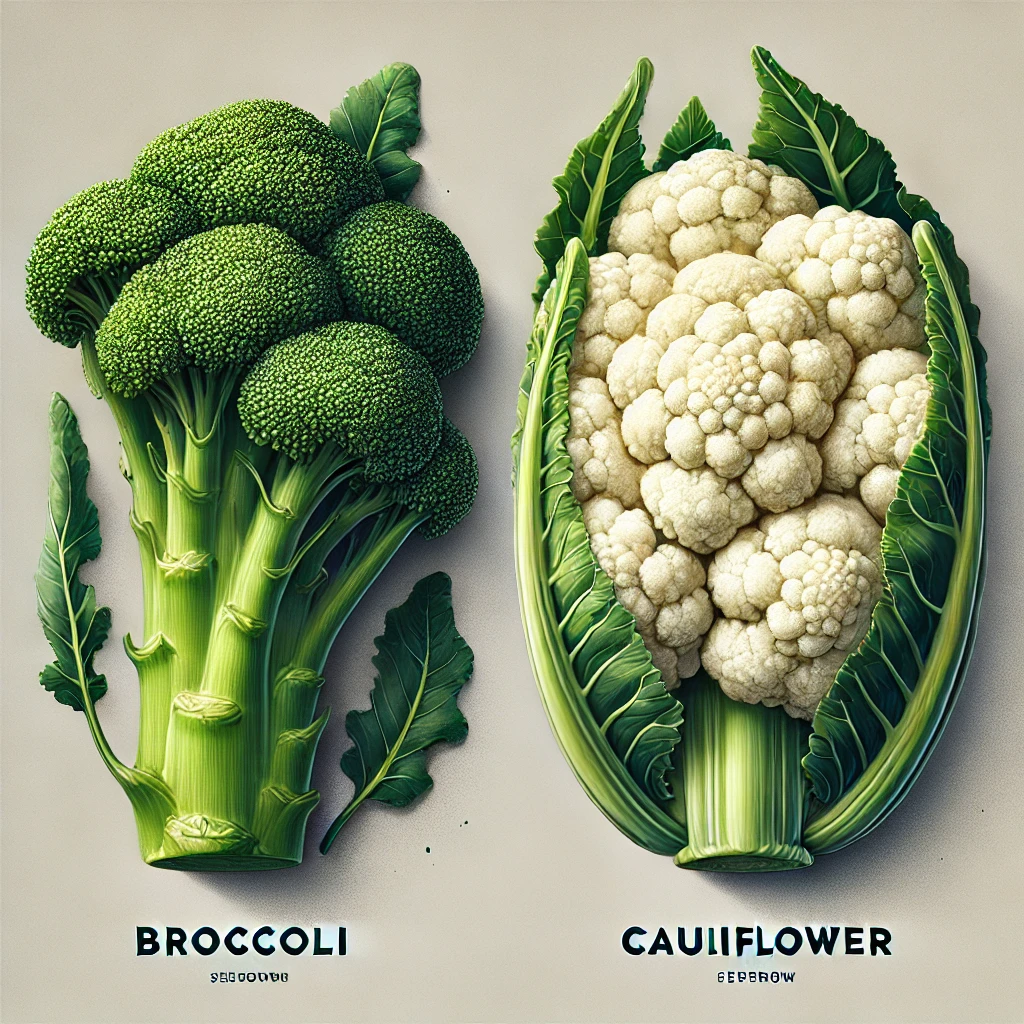When it comes to cruciferous vegetables, two of the most popular and commonly debated options are broccoli and cauliflower. Both of these vegetables are nutrient powerhouses and have earned a solid reputation for being essential to a balanced, healthy diet. But the question remains: Which one is healthier—broccoli or cauliflower?
In this article, we’ll dive deep into the nutritional values, health benefits, and specific advantages of both vegetables to help you make an informed decision. Whether you’re into exploring different broccoli recipes or are curious about broccoli benefits for males and females, this guide has got you covered.
Nutritional Value: Broccoli vs Cauliflower
Let’s start by comparing the overall nutritional profile of these two cruciferous vegetables. Both belong to the Brassicaceae family, also known as the cabbage family, which includes kale, Brussels sprouts, and cabbage. Despite their similar appearance, they each bring different benefits to the table.
Broccoli: The Nutritional Powerhouse
Broccoli is often considered one of the most nutrient-dense vegetables. It’s loaded with vitamins, minerals, fiber, and even a small amount of protein. One cup of raw broccoli provides:
- Vitamin C: 90% of the daily recommended intake (DRI), boosting immune function.
- Vitamin K: 116% of DRI, supporting bone health and blood clotting.
- Fiber: 2.4 grams, aiding in digestion and helping to maintain a healthy weight.
- Calcium: 43 mg, contributing to bone health.
- Broccoli Protein Content: 2.5 grams per cup, which is surprisingly good for a vegetable.
- Sulforaphane: An antioxidant known for its cancer-fighting properties.
Not only is broccoli a nutrient-dense food, but it’s also versatile in cooking. Whether you’re steaming it, roasting it, or using it in a variety of broccoli recipes, it’s hard to go wrong with this green veggie.
Cauliflower: Low-Calorie, Nutrient-Rich
On the other hand, cauliflower is also packed with nutrients but shines more as a low-calorie, low-carb option. One cup of raw cauliflower offers:
- Vitamin C: 57% of DRI, aiding in immune function.
- Vitamin K: 20% of DRI, supporting bone health and blood clotting.
- Fiber: 2.1 grams, helping digestion.
- Calories: Only 25 calories per cup, making it an ideal choice for weight management.
- Choline: 45 mg, which is essential for brain health and cognitive function.
Like broccoli, cauliflower can be a versatile ingredient in various dishes. It’s commonly used as a low-carb substitute for grains, such as cauliflower rice or pizza crust.
Health Benefits of Broccoli
Broccoli offers an array of health benefits, from boosting the immune system to supporting heart health. Here are some of the key reasons why you might want to include more broccoli in your diet:
1. Rich in Antioxidants
Broccoli is loaded with antioxidants like sulforaphane, which helps combat oxidative stress. This, in turn, reduces inflammation and protects cells from damage.
2. Cancer Prevention
One of the most talked-about broccoli benefits is its potential role in cancer prevention. Sulforaphane is linked to the reduced risk of several cancers, including breast, prostate, and colon cancer.
3. Promotes Heart Health
Broccoli contains high levels of fiber, potassium, and antioxidants, which help reduce cholesterol levels and lower the risk of heart disease.
4. Supports Bone Health
Thanks to its high levels of calcium and vitamin K, broccoli contributes to strong bones and reduces the risk of osteoporosis, especially in females. This is one of the critical broccoli benefits for females, as they are more prone to bone density loss as they age.
5. Digestive Health
The fiber content in broccoli promotes healthy digestion and prevents constipation. It can also improve gut bacteria, enhancing overall digestive function.
6. Broccoli Benefits for Males
Broccoli is especially beneficial for males, as it supports prostate health. The antioxidants in broccoli help reduce inflammation and lower the risk of prostate cancer, which is a significant health concern for men.
7. Broccoli Protein: A Surprising Boost
While we don’t typically look to vegetables for protein, broccoli does provide a decent amount for a vegetable. This makes it an excellent addition to plant-based diets, ensuring you get that extra protein boost.
Health Benefits of Cauliflower
Though often overshadowed by broccoli, cauliflower has its own impressive list of health benefits. Let’s take a closer look at what cauliflower brings to the table:
1. Low in Calories, High in Fiber
Cauliflower is incredibly low in calories, making it a great option for those trying to lose weight. Despite being low in calories, it’s rich in fiber, which helps you feel full and satisfied.
2. Anti-Inflammatory Properties
Like broccoli, cauliflower contains glucosinolates and other compounds that have been shown to reduce inflammation in the body. This can be particularly helpful in reducing the risk of chronic diseases, such as heart disease and diabetes.
3. Supports Brain Health
One of the less commonly known benefits of cauliflower is its choline content. Choline is a nutrient that supports brain function, cognitive development, and may even improve memory.
4. Weight Loss
Cauliflower’s low-calorie and low-carb profile makes it an excellent weight management choice. It’s often used as a substitute for higher-carb foods, like potatoes and rice, allowing people to enjoy their favorite dishes without the added calories or carbs.
5. Cauliflower for Heart Health
The fiber, antioxidants, and potassium in cauliflower support heart health by helping to lower blood pressure and cholesterol levels.
Which is Healthier? Broccoli vs Cauliflower

So, which vegetable comes out on top—broccoli or cauliflower? The answer ultimately depends on your specific health goals and dietary needs.
- If you’re looking for cancer-fighting properties: Broccoli has the edge, thanks to its high sulforaphane content, which has been shown to have anti-cancer properties.
- If you’re focusing on weight management: Cauliflower’s low-calorie, low-carb content makes it the better choice, especially for those following a ketogenic or low-carb diet.
- For bone health: Broccoli is richer in calcium and vitamin K, making it ideal for promoting bone health, especially in women.
- For brain health: Both vegetables support cognitive function, but cauliflower stands out due to its choline content.
Broccoli Family Name and Interesting Facts
Broccoli belongs to the Brassicaceae family, and its broccoli family name links it to other cruciferous vegetables like kale, Brussels sprouts, and cabbage. These vegetables all share similar nutrient profiles and health benefits.
Broccoli pronunciation might vary depending on where you are, but the most common is “brok-uh-lee.”
Did you know that broccoli wasn’t always part of our diet? Wondering, who invented broccoli? While no one “invented” it in the modern sense, it was selectively bred from wild cabbage in the Mediterranean region, with origins dating back to the Roman Empire.
Conclusion: A Vegetable Power Duo
In conclusion, both broccoli and cauliflower are nutrient-packed, versatile vegetables that offer numerous health benefits. Choosing between the two largely depends on your dietary preferences and health goals. Whether you’re in it for the protein boost from broccoli or the low-calorie benefits of cauliflower, both are excellent choices for a healthy diet.
If you’re looking for some variety, try mixing them up in your meals. Experiment with different broccoli recipes and cauliflower-based dishes. That way, you get the best of both worlds!
FAQs
1. Is broccoli higher in nutrients than cauliflower? Yes, broccoli tends to have higher amounts of certain nutrients, like vitamin C, vitamin K, and fiber. However, cauliflower is lower in calories and carbs, making it ideal for weight management.
2. Can I eat both broccoli and cauliflower together? Absolutely! Broccoli and cauliflower complement each other well in both taste and texture, making them a great duo in stir-fries, salads, or even roasted dishes.
3. What are some easy broccoli recipes to try? Some easy broccoli recipes include roasted broccoli with garlic, broccoli stir-fry, and broccoli cheese soup.
4. Which is better for weight loss: broccoli or cauliflower? Cauliflower is lower in calories and carbs, making it the better option for those on a weight-loss journey. However, both can be part of a healthy, weight-conscious diet.
5. Does broccoli have more protein than cauliflower? Yes, broccoli contains slightly more protein than cauliflower, making it a better choice for those looking to add more plant-based protein to their diet.


